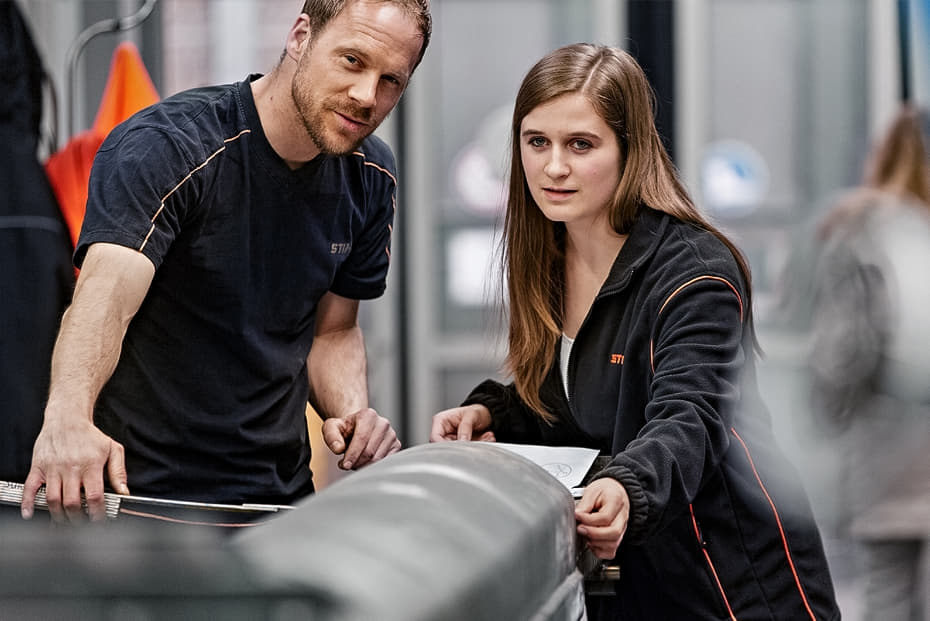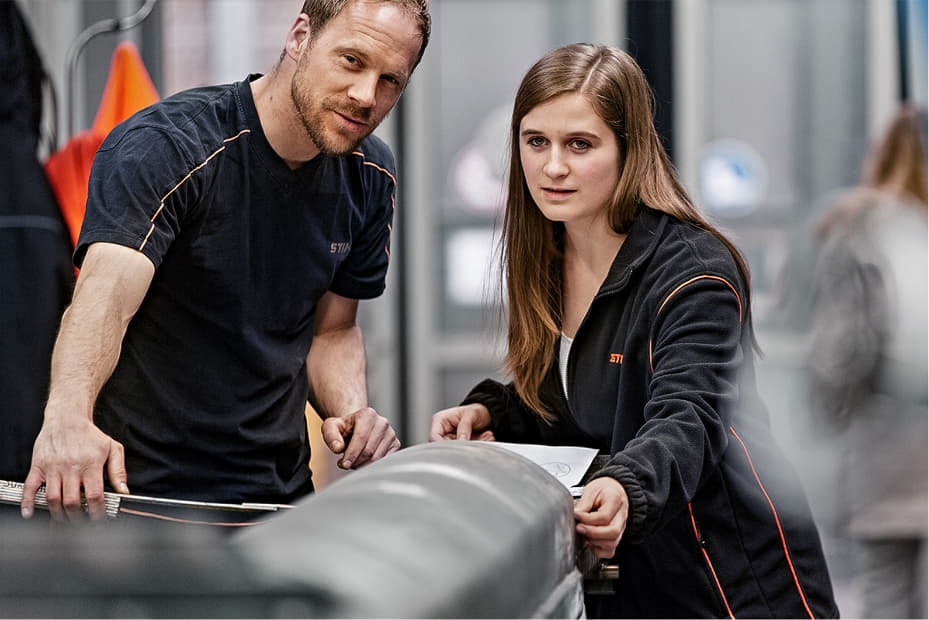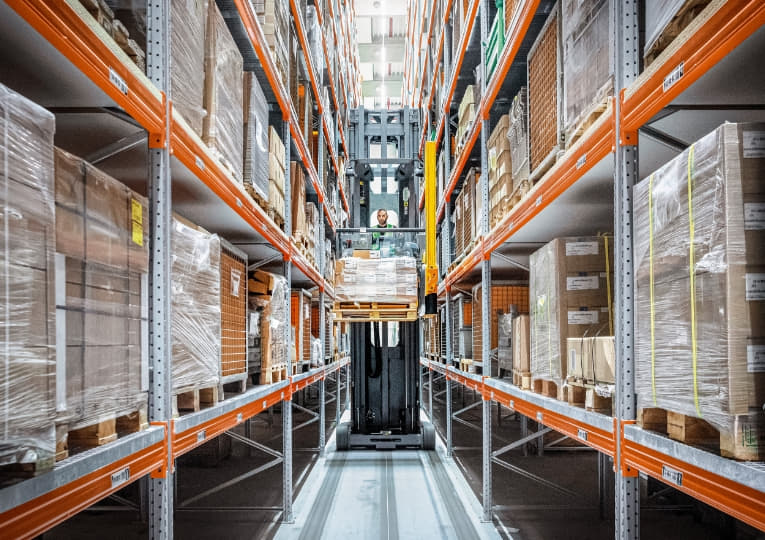Side by side and hand in hand
STIHL is a global market leader and a family-owned business. As an employer, we combine the best of both worlds. With our deep roots in a corporate culture built on partnership, benefits, and family-friendly working hours, we give employees the opportunity to grow.
Organization and responsibilities
Overall strategic responsibility for personnel management at the STIHL Group lies with the STIHL AG Executive Board member for Human Resources and Legal Affairs. Each major STIHL company has its own human resources department, whose work is subject to guidelines set by the founding company. The guidelines cover topics such as staffing changes and the introduction of pension systems, contracts, and compensation rules.
International human resources strategy
The world is changing, and so is STIHL. Human resources has a key role to play to this end. An international human resources strategy was defined in 2020 to make the human resources team a transformation partner that can help drive the company’s evolution. The strategy aims to optimize existing structures, roles, and capabilities in human resources and enable it to meet new demands in the long term. The new direction in human resources also creates a foundation for preparing employees, managers, and executives for the future.
The new human resources strategy focuses on digitalizing processes in human resources (Digital HR) and creating a global HR community with common standards and processes (ONE HR). The Digital HR field of action aims to increase the efficiency of transactions while simplifying and strengthening global evaluation, analysis, and reporting measures. It will also enable employees and supervisors to access data and HR processes on their own. To this end, a project has been launched to coordinate the introduction of a global master data system using the SAP SuccessFactors software. The rollout throughout the STIHL Group is scheduled for completion by the end of 2024.
The ONE HR field of action focuses on combining the individual human resources departments to form a single global HR strategy that is effective on both a local and global level. The approach will be associated with standardized, global processes based on clear strategic guidelines and tools, such as staff development benchmarks, harmonized advanced training opportunities, and a common understanding of leadership. Part of the strategy includes the development of the global STIHL Leadership Principles, which have been gradually rolled out throughout the Group since the end of 2021 in the form of the new STIHL Leadership Academy.
Employment within the STIHL Group
As of December 31, 2021, STIHL Group companies employed 20,094 people worldwide (previous year: 18,200). The figures given in this report take into account all German locations (including STIHL direct GmbH, STIHL Digital GmbH, SDP Digitale Produkte GmbH, and STIHL International GmbH), the Dieburg distribution center, and all production companies, including the ZAMA Group. The calculation results in a total headcount of 18,338 (previous year: 16,493), which forms the basis for the disclosure of further performance indicators.
During the reporting period, there were 4,694 new hires (previous year: 3,931), including employees with temporary contracts, apprentices, and students. Temporary agency workers are not included. The current reporting system does not provide for a detailed disclosure of new hires by age group or gender. However, such disclosures are under consideration for future reports.
The increase in headcount to 18,338 as of December 31, 2021, is attributable in particular to the positive business performance of the STIHL Group and the expansion of production and development activities in Brazil and China, and at the company’s German locations. Roughly 83 percent of the Group’s employees have permanent contracts (previous year: 82 percent). Generally, we aim to create safe and secure jobs. In doing so, we make a contribution within our means to achieving the target of full employment, as stated in the United Nations Sustainable Development Goal “Decent work and economic growth” (SDG 8).
Employment within the STIHL Group
as of DEC. 31
| 2021 | 2020 |
|---|
| | | |
| Total headcount within the STIHL Group1 | 20,094 | 18,200 |
|---|
| Total headcount within the scope of consolidation1 | 18,338 | 16,493 |
|---|
| Of which apprentices and students | 889 | 768 |
|---|
| Average headcount1 | 17,469 | 15,602 |
|---|
| Number of temporary agency workers | 715 | 726 |
|---|
Headcount by region1
as of DEC. 31, 2021 (previous year in parentheses)
Total headcount by type of employment1
As of Dec. 31 (previous year in parentheses)
Workers’ rights
Open and constructive exchange with employee representatives has traditionally been a top priority at STIHL. All STIHL plants in Germany have employee councils, which together form the General Employee Council for the founding company. Work agreements for staff are in place. Local employee representation bodies exist in accordance with national law in certain countries, such as Brazil and China. Many production companies are subject to collective bargaining agreements or similar collective wage structures, which cover roughly 55 percent (previous year: 54 percent) of all staff. By protecting workers’ rights, we are making our contribution to achieving the United Nations Sustainable Development Goal “Decent work and economic growth” (SDG 8).
Attractive employer
Fair cooperation in a spirit of partnership with support from colleagues and open communication is a key element of our corporate culture. Long terms of service and low rates of voluntary resignation (excluding retirements) are the norm at nearly all of our locations. Turnover among permanent employees in indirect areas, which refers to staff not employed in production, stood at 3.7 percent for the underlying consolidated group. Due to the low rate, we do not keep records of voluntary resignation by region, gender, or age group.
To foster international cooperation within the overall STIHL Group, we offer employees the opportunity to work abroad. The valuable experience gained with international colleagues at STIHL Group companies in other countries has a positive effect on mutual understanding and collaboration. It also enriches the STIHL Group as a whole.
Benefits and perks
STIHL has a tradition of granting voluntary social benefits that go far beyond what is agreed upon through collective bargaining. As an example, employees receive a bonus linked to financial performance at nearly all STIHL companies every year. Employees at the founding company also have the option of taking part in a company pension plan that is financed entirely by STIHL, as well as acquiring profit participation rights within the Scope of a stock ownership plan. Depending on the company’s success, those participation rights may offer yields as high as 10 percent, allowing staff members to benefit from their dedication and performance by adding to their savings. At STIHL, profit participation rights consist of an employee contribution (one-third) and an employer subsidy (two-thirds).
In addition, a new employment and site-guarantee agreement through the end of 2025 was signed in late 2021. The agreement includes a four-year employment guarantee for core staff at ANDREAS STIHL AG & Co. KG. STIHL has also made a commitment to continue providing extensive vocational training and support to new employees just entering the workforce. The deal continues a successful tradition of significant employment and site-guarantee agreements stretching back more than 20 years.
Work-life balance
We have taken a variety of steps to accommodate the needs of our employees and help them achieve a better balance between the working world and private life. At most locations, Group member companies work with employees to arrange flexible working models that take childcare, family care, and other personal circumstances into account. Our approach is complemented by local benefits, such as a company day-care center at the founding company and a lactation room for new mothers at our Swiss chain plant.
The coronavirus pandemic has made remote working more common and has highlighted the advantages these types of arrangements for employees and employers alike. Going forward, employees will continue to have the option of contractually agreed work-from-home periods and work-from-anywhere arrangements.
Awards
STIHL Brazil has repeatedly been honored with the Great Place to Work seal, which recognizes it as one of the country’s best employers. The São Leopoldo company has received particularly high marks for its positive working environment.
Diversity and equal opportunity
As a global family-owned business, STIHL stands for internationality, transparency, and diversity. We care deeply about empowering our employees to bring their unique strengths, experiences, and potential to the fore, regardless of their gender, origin, age, and other traits. We do not tolerate racism or any form of discrimination, and we support the inclusion of people with disabilities. It is our aim to enhance transparency regarding nondiscrimination and equal opportunity throughout the Group. In 2022, we plan to define appropriate measures and targets to further foster diversity and inclusion in the workforce.
At the present time, women account for 29 percent of our total workforce within the STIHL Group (previous year: 28 percent). One STIHL AG Executive Board member is a woman. As a result, STIHL has met its own target of having at least one woman on the Executive Board. With three women and three men, the composition of the Executive Board will be equally balanced starting in 2023. Five of the twelve members of the STIHL Supervisory Board are women, exceeding the statutory requirement in Germany of at least 30 percent.
Total headcount by age1
As of Dec. 31, 2021 (previous year in parentheses)
Professional development and training
Technologies and markets are subject to constant transformation, necessitating changes in the way we work. Workers face the challenge of adapting to new situations while continuously growing and learning. Because lifelong learning and constant growth are an important part of our culture, we provide employees with a wide range of measures designed to support them.
The competency model
All members of staff make a substantial contribution to the success of STIHL through their individual know-how, abilities, and skills. The STIHL competency model has been developed to maintain these capabilities and tap into new potential. Based on findings from surveys and workshops involving employees and supervisors, the competency model forms the foundation for a common understanding of requirements. It consists of eight fields of competence that relate to specific expertise, as well as motives, attitudes, and values. The Scope of these fields of competence ranges from entrepreneurial thought and action to partnership-based leadership and shaping change. The competency model will be phased in at all companies to ensure a consistent approach to talent development and succession planning throughout the STIHL Group.
STIHL learning world
To foster the expertise of our staff and develop new capabilities, we offer an extensive selection of seminars at nearly all STIHL locations. These seminars include internal and external classroom training sessions and a growing number of digital learning opportunities that focus on social and interpersonal skills, methods, project management, and dedicated technical training for employees who manufacture or assemble products. On average, each employee receives roughly twelve hours of professional development a year (previous year: eight). That figure is currently not broken down by gender or employee category in our reporting system. However, we plan to keep records of such data in the future.
The new internal learning management system STIHL HR Online-Training was launched in Germany in May 2020. Employees can use the system to find out about continuing education opportunities and book training activities directly. The system is scheduled for launch at additional STIHL Group companies in the future. STIHL Brazil will gain access to the learning management system in early 2022.
We also offer employees support in completing professional training measures, such as gaining master tradesperson certification or pursuing a degree program. STIHL offers engineers and mechanics who currently work in the gasoline-powered drive technology division training and qualification in the fields of electrical engineering and mechatronics as part of a college-level certification program. The program reflects our dedication to supporting members of staff throughout our transformation and to empowering them to take on new responsibilities at STIHL in areas such as electronics by acquiring knowledge.
Executive development
Leadership that provides motivation and empowerment is crucial to a positive culture of cooperation and the success of the Group. Since managers, executives, and supervisors face a complex array of requirements and expectations, STIHL makes sure to support them with a program of qualifications. While newer managers at the founding company earn a Führungsführerschein, or “license to lead,” experienced managers have the opportunity to reflect on and enhance their current approach in dedicated sessions. Training is rounded out by a STIHL mentoring program that allows long-serving managers to pass on their experience to the leaders of tomorrow. The mentoring program usually lasts twelve months and ensures a long-term approach to fostering talent.
In 2021, STIHL partnered with SGMI Management Institute St. Gallen in Switzerland to develop a general management program for international senior executives. The program aims to impart strategic management knowledge, offer new perspectives on the latest leadership issues, and strengthen international exchange. The Executive Board has nominated 16 participants for the first leg of the program in 2022.
Executive surveys are conducted every year at the founding company and at the production companies in Austria, Switzerland, Brazil, the U.S., China, and the Philippines. The aim of the surveys is to gain insights into the leadership culture and identify starting points for further development.
Vocational training and degree programs at STIHL
STIHL has a long tradition of placing a high priority on training. In addition to a wide range of vocational training opportunities focusing on technical and office careers, we work with colleges and universities to offer internships and work-study positions for students in cooperative education programs. The goal is to provide optimal preparation for working in occupations requiring various qualifications and for a successful career at STIHL. We invest worldwide in state-of-the-art apprenticeships and comprehensive training programs. Larger STIHL companies provide “dual” training in the classroom and on the job. In recent years, established training concepts have also been rolled out at STIHL companies where the state school system does not provide this type of training, such as in the U.S. and Brazil, and at the Chinese plant in Qingdao.






